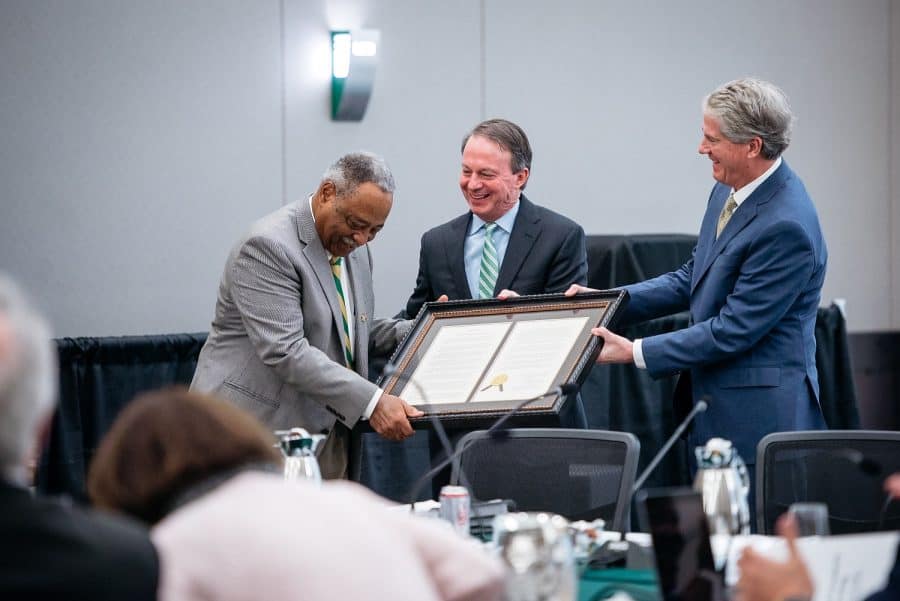Judge John England leaves legacy on campus
Courtesy of UA news
February 25, 2019
John H. England Jr. believed he was attending a regular Board of Trustees meeting in Birmingham on Feb. 8. As the meeting began to conclude, England said he had no idea he was in store for the surprise that came.
The New Freshman Residence Hall that opened in fall 2018 is now named after England, a member of the Board of Trustees of The University of Alabama System.
“Today we have the opportunity to honor an individual who has made many contributions to our system, our institutions, our state and our local community,” trustee Joseph Espy III said in the video of the surprise event. “As The University of Alabama began the process of selecting the name of its new freshman residence hall, one name immediately came to the forefront.”
As Espy continued reading the resolution approving the naming of John H. England Jr. Hall, England came to the realization that Espy was speaking about him. England said it was a humbling experience and a moment to cherish.
England is originally from Uniontown, Alabama, and growing up, he did not consider going to law school. While England was a young boy, he read about George Washington Carver which motivated him to want to become a chemist. He later majored in chemistry at Tuskegee University and earned his bachelor’s degree in 1969.
During his time at Tuskegee University, the civil rights movement was going strong, and he was motivated to make a difference.
“Often times there was a great deal of encouragement to make a contribution in the civil rights movement, and I guess in my junior year I felt like the best way I could contribute would be in law,” England said.
As a junior in college, England got to participate in the Council on Legal Education Opportunity (CLEO) program at Harvard University and spent a summer learning about law. After England completed this program, he knew he wanted to attend law school.
“I knew that I wanted to go to law school, and though there were some opportunities to go to some schools in the Northeast, Yale comes to mind, I knew that I wanted to go to Alabama,” England said.
While England was still at Tuskegee University, he said students from The University of Alabama School of Law came to recruit students there in an effort to begin integrating the University’s law school. England then applied and began his journey.
As one of the first few African-Americans to be admitted into The University of Alabama School of Law in 1969, England finished his first year of school and then was drafted to Vietnam, where he spent two years in the military. He then returned to the UA School of Law, now named the Hugh F. Culverhouse School of Law, to earn his law degree and graduated in 1974.
As a young lawyer, England practiced extensively in Hale County, Greene County and Perry County by working with criminal law and voting rights issues. He also participated in civil rights work and represented school boards and county commissions. At the time there were no African-American lawyers who resided in those counties.
“They were happy to hire a black lawyer,” England said.
Later, England served as a justice on the Alabama Supreme Court from 1999-2001. He is now a circuit court judge in Tuscaloosa.
England is the father of three children who have all graduated from law school, his two sons John III and Christopher, and his daughter April England Albright.
Director of Housing Administration Amanda Ingram said freshman students are enjoying the new residence hall, as it provides study spaces and common areas for events.
“What is now called the John H. England Jr. Hall was opened in August of this year,” Ingram said. “It has space for about 496 residents. Each of the rooms is a double occupancy bedroom with a private bathroom shared between two residents.”
The John H. England Jr. Hall is coed by floor or wing. Students can use their ACT cards to have access into the building, wings, elevators and their bedroom.
“It’s a bit of a compromise between the traditional halls and the suite-style halls. … it’s got the double occupancy rooms but not the community bathrooms,” Ingram said. “I think it’s nice to have an additional option for residents on campus.”
Anne Miles Golson, a law student at the University, said she believes England represents what the law school wants to represent in a positive way.
“I think it’s great to have someone who is so distinguished and has had such an impactful career have their name on a building that’s really in the public eye so that maybe more people will know about him and what he’s done,” Golson said.
As a student, England said he did not think he would be where he is today.
“What young folk ought to do with the opportunities that The University of Alabama provides for them, if their first thought is to help somebody else, that the reward will be great,” England said. “That’s what I go by.”










